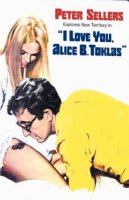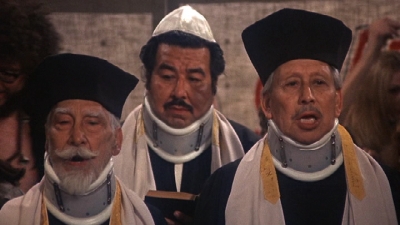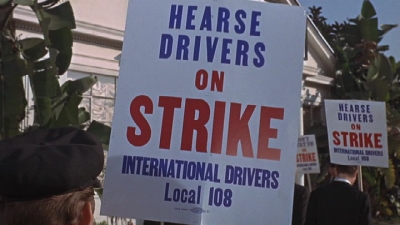 BUY IT AT AMAZON: CLICK HERE!
BUY IT AT AMAZON: CLICK HERE!
STUDIO: Warner Bros. Home Entertainment
MSRP: $19.98
RATED: R
RUNNING TIME: 93 Minutes
SPECIAL FEATURES: Theatrical trailer
The Pitch
"It’s Peter Sellers in the scene, man. How much more groovy can you get?"
The Humans
Peter Sellers, Leigh Taylor-Young, Jo Van Fleet.
The Nutshell
Uptight lawyer Harold Fine (Sellers) is about as much a captain of his life as Inspector Clouseau is a master of forethought. He deals with boring cases during the day, and at night finds his future planned out by his smothering girlfriend (Van Fleet). So when a cool hippie chick gives him a gift of Alice B. Toklas’ special brownies, he seizes upon the opportunity to throw out the detritus he has built up during his life and join the generation of peace and love.

How do you say "Sh’ma" in Spanish?
The Lowdown
I Love You, Alice B. Toklas is riddled with great lines. The first thing you hear is a hippie guru quoting one of Tennyson’s more romantic poems. After a particularly florid stanza, one of his young pedagogues pipes up: "Is that Ginsberg?" That’s the sort of humor you’re in for during the first sixty minutes of the film. The writing is droll, natural, and dry.
Exactly the sort of soil that Peter Sellers can take root in. His Harold Fine is something of a less neurotic, more apathetic Woody Allen, with great lines like: "What are you trying to do to me, kill your mother?" that flash past with such great timing that the direction and editing don’t even need to contribute.
Despite — or maybe because of — Sellers great performance, this isn’t a comedy of characters. It’s a situational comedy in the strictest sense: the humor is mostly derived from context, setting, and spectacle. There’s a wonderful scene between Harold and his hippie brother Herbie at a street-side flea market. Herbie tries to explain how the children of love share things that are necessary, like clothes. "So, it’s like communism," replies Harold. Herbie is quick to protest. As a peace offering, Harold finds a copy of Chairman Mao’s little red book, and buys it for his brother. "Thanks, man. This looks like a great book."

The florist’s union was also on strike, but everyone thought
their picket line was a roadside market.
The film takes a bit of a left turn during the last thirty minutes, when Harold tosses away his squarishness for a long-haired, reasonably-free love lifestyle. It’s a dramatic shift in tone that isn’t quite as successful, from a comedic standpoint, as the first two acts, since its main source of humor comes from embarrassing Harold as much as possible. Sellers performs admirably, but he’s tied to the success of the scenario.
There’s a nugget of serious thought buried in all the farce, and a worthy question: is love a decision or an emotion? Harold’s decisions carry the first two acts, while his emotions rule the third. The answer to the question ought to be a balance of the two extremes, but I Love You, Alice B. Toklas never reaches a conclusion. The end is unsatisfying (not in the least because of editing for ambiguity) because it presents Harold moving toward compromise, and then casting it off.
That leaves the movie in something of a limbo, in which it seems to aspire to nothing more than idle entertainment — it’s neither great comedy, nor truly human comedy. It’s elevated by Sellers’ twin performances, but comes to rest in the territory of the opportunist lampoon, taking potshots at the hippie subculture.

How embarrassing. The tag, man. The tag.
The Package
There’s very little to say, here. Decent transfer, but desaturated, with poor dynamic range. Not a single bonus, apart from the theatrical trailer.
The cover’s a nice painting, based on a sequence in the film that involves the curious sexual combination of Leigh Taylor-Young and Peter Sellers.
Hey, man, I’m not here to judge you.